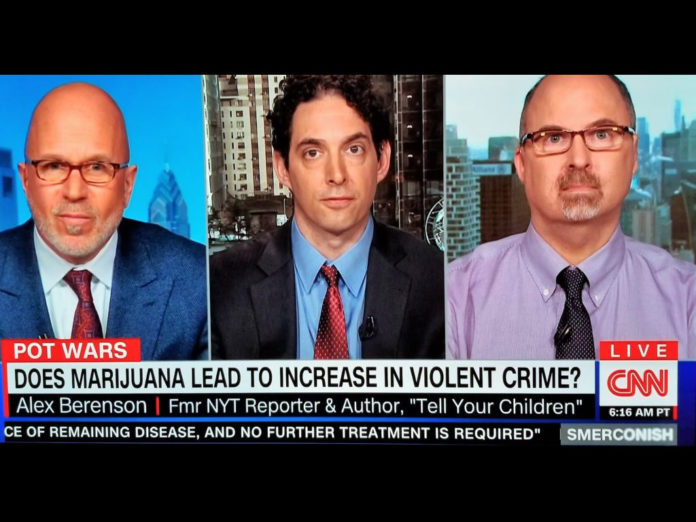LOS ANGELES – Alex Berenson, a former New York Times reporter, fiction writer, and author of the just-released nonfiction book, Tell Your Children: The Truth About Marijuana, Mental Illness, and Violence, appeared on Smerconish this weekend, where he engaged in a brief repartee with Dr. David Nathan from Doctors for Cannabis Regulation. The subject of the debate was the thesis of Berenson’s book, which host Michael Smerconish framed as “[cannabis] advocates are ignoring dark truths about the drug,” and “extensive teenage use of today’s much more powerful and available pot is leading to psychosis and violence.”
Berenson well-timed the release of his book, which was written precisely to elicit the alarm and attention it is receiving. If his intent was to troll the cannabis industry and the public while gaining the sort of media attention any author would covet, including appearances on television shows, he has succeeded beyond his publisher’s dreams. Media attention has not been wanting.
But if his appearance on Smerconish this weekend also was an indication of the level of debate we can expect on such a potentially serious subject, beyond selling a few books it’s hard to see how Berenson will succeed in doing anything but annoy people. Greater impact is unlikely given the unyielding nature of his positions, which include decriminalizing but not legalizing cannabis for recreational use.
With only 30-minutes to work with, Smerconish kept the cannabis segment fast and furious, with questions short and to the point. He first asked Berenson if he wrote the book to create zero tolerance or raise awareness.
“Oh no, I’m not for zero tolerance,” replied Berenson. “There is no way we are going to put 40 million people in jail or prison for marijuana. We need people need to know the risks here, and we need to come up with a scheme for regulation and probably decriminalization—I don’t favor full legalization—but decriminalization, where users are going to get the information they need, and they’re going to get help if they need help. But most of all, we need to make sure they know the risks about this drug, that most of the medical claims around it are not proven and not supported by much scientific evidence, and that this can be an addictive drug, that it is a potent drug, that it is linked to psychosis. That’s what I want, and that’s why I wrote the book.”
“The idea that it leads to violence seems so counter-intuitive,” continued Smerconish. “Do you not buy into the stoner stereotype?”
“Obviously, there are plenty of people who can use marijuana and not become violent,” replied Berenson, “but psychosis is a known risk for violence, and cannabis use is a known risk for psychosis. It’s funny, with alcohol, we have people out there who drink a lot, some of them get violent, some of them sit at home on their couches and drink scotch until they fall asleep. We know both those things are true. They can both be true for marijuana, and the evidence suggests—the hard, scientific evidence suggests that those both are true, but we’ve sort of forgotten that.
“Relative to mental illness,” asked Smerconish, “is the argument that smoking pot causes mental illness or that it exacerbates those traits and characteristics of folks who are already afflicted?”
“It can certainly cause temporary psychotic episodes,” stated Berenson. “It can cause paranoia, it can cause panic attacks, it can cause temporary psychotic episodes. I think the evidence is quite strong, and the National Academy of Medicine report from 2017 said, ‘Cannabis use raises the risk of developing schizophrenia. The higher the use, the higher the risk.’ That to me is very clear language. There are people on the advocacy side—and I suspect Dr. Nathan may be one of them—who say that hasn’t been proven yet. I think it has been proven enough that it is something we need to warn people about.”
Smerconish then asked Dr. Nathan to address the issue of cannabis and violence.
“It is pretty clear that what Alex is saying is simply not supported by science,” said Nathan. “There is [no] correlation between cannabis and violence, and in fact some studies actually show the opposite. Can you find studies that show that there is some linkage? Yes, and you can also find studies that show no effect. And just recently there was a study showing that rates of domestic violence has decreased among cannabis-using couples.”
“On the issue of mental health,” continued Smersonish, “what connection if any do you believe exists between smoking pot and psychosis or schizophrenia?”
“The claim that advocates have been either suppressing or denying what’s going on with cannabis and its effect on mental health is simply not true,” he replied. “First of all, I wrote a paper in 2013 about the possible relationship between the triggering of psychosis and the exacerbation of psychosis among cannabis users that are predisposed to psychosis. Perhaps, Alex, you should have read that.
“The bottom line is that we know that the arrow goes in the opposite direction,” he added. “The people predisposed to mental illness will self-medicate with cannabis, and that’s also true with people with psychosis. Now, as far as educating the public about the risks of psychosis, I agree, it’s important to acknowledge the degree to which people who are predisposed to psychosis should not be using cannabis recreationally, certainly not outside their doctor’s supervision. But I would say that this book you have written that is really one-sided, and as you say in your opening chapter, that it is not intended to be balanced. Well, that’s a real disservice to the public, which needs to know what the real risks and the real health benefits to cannabis are. This whole thing just sidesteps the question of the social justice costs and public health costs of prohibition.”
Asked to respond, Berenson jumped on a perceived weakness in Nathan’s argument. “The doctor did not say that cannabis does not cause at least temporary psychosis, because he knows the truth about this,” he said. “I have more than a dozen studies in the book with rate ratios that show an actual increase in violence in cannabis users. There is devastating data regarding child fatalities and child near-fatalities that show a huge percentage of the people in multiple states who are involved in the death or near-death of a child in their care are using cannabis at the time. There is a lot of data that has been sort of quietly piling up over the past five or ten years, and I think advocates are going to need to grapple with this. This is real. This does not mean that we are going to put millions if people in jail for cannabis use, but we need to understand that this drug is not risk-free, it’s not the panacea it’s sold as by both the cannabis community and the for-profit dispensary and grower community.”
Out of time, Smerconish ended the debate, but at the end of the program he revealed the results of his weekly poll, which postulated the question: Do you believe that cannabis is dangerous to the brain and can ultimately cause violence?
Decidedly unscientific but comprised of 10,937 votes, results were:
No – 78 percent
Yes – 22 percent
Of note, Berenson’s book also received the Vox treatment today in an extensive article by German Lopez titled, “What Alex Berenson’s new book gets wrong about marijuana, psychosis, and violence.” The subhead reads tellingly, “The book, Tell Your Children, has received a lot of media attention, but it’s essentially Reefer Madness 2.0.” Lopez based his opinion on his previous evaluation of the same study Berenson used to make his case.









